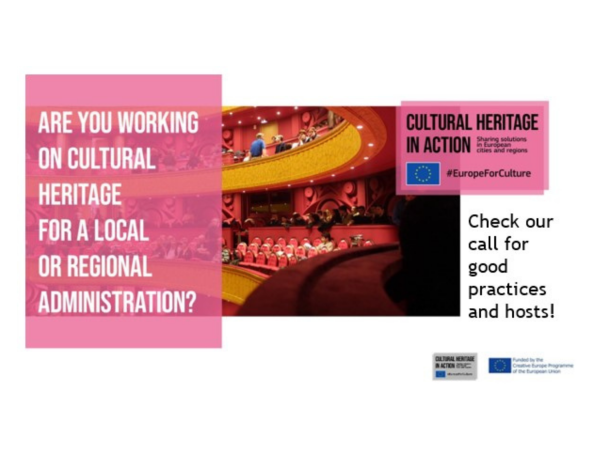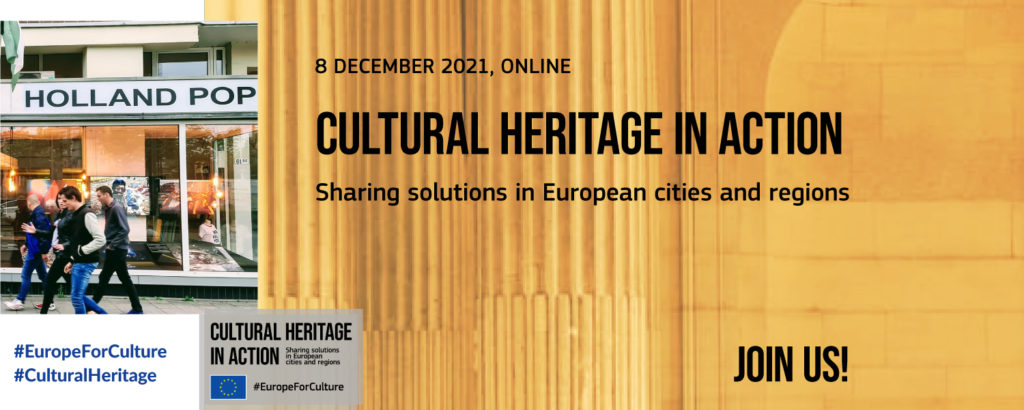

Cultural heritage is key to Europe’s future and a crucial resource and strategic assets for cities and regions’ sustainable development. Cultural heritage ranks high in the strategic priorities of local and regional authorities. This is one of the main learnings from 18 months of peer-learning on cultural heritage for European cities and regions, as part of the Cultural Heritage in Action project funded under the Creative Europe programme of the European Union. The project has focused so far on three topics: participatory governance of cultural heritage; adaptive reuse of built heritage; quality of interventions on cultural heritage.
During its first phase, Cultural Heritage in Action had an important impact on capacity building in cultural heritage-led development in European local and regional administrations as well as for stakeholders. So far, 32 cities and regions are featured in Cultural Heritage in Action’s catalogue of good practices, 165 representatives from cities and regions have been involved in peer-learning visits, as well as 57 stakeholders and 10 representatives from national and European administrations.
It is now time to take stock of what has been achieved and look towards the future. We want to share the findings of the first phase of the project and raise awareness on future peer-learning activities for cities and regions, reflecting the post pandemic situation and its impacts on cultural heritage.
Schedule
8 December 2021
10.00 | Opening by European Commission Director General for Education and Culture
The event will open with a word from European Commission Director General for Education and Culture Themis Christophidou. She will focus on how the EU supports cultural heritage in cities and regions.
- Themis Christophidou, European Commission Director General for Education and Culture
10.20 | Cultural heritage working for Europe’s future
High level speakers will provide us with their thoughts on the future of cultural heritage, its relation to a sustainable recovery in European cities and regions, its capacity to empower citizens, and how can cultural heritage be a vehicle for cohesion and wellbeing and a driver for a more sustainable development.
- Mayor Dario Nardella, Mayor of Florence and Eurocities President (TBC)
- Member of the European Parliament Sabine Verheyen, Chair of Culture Committee (TBC)
10.55 | Trends and surprises from Cultural Heritage in Action
If you are not yet familiar with the project, this short session will provide an overview of its main focus and past activities. Throughout the past 18 months, the project has mapped out good practices and developed a catalogue of 32 good practices across Europe and set up 10 online peer-learning visits, involving altogether more than 190 cultural practitioners and policymakers to share knowledge and insights. Three core topics formed the bedrock of all the project activities: Participatory governance of cultural heritage; Adaptive reuse of heritage buildings; Quality of interventions on cultural heritage.
- Julie Hervé, Eurocities senior policy advisor on culture
- Marie-Claire Dangerfield, Expert in Information Management at Stadsarchief Rotterdam
- Nils Scheffler, urban expert from Berlin
11.20 | Launch of the Cultural Heritage in Action web publication
Cultural Heritage in Action is proud to present its first web publication! The objective of this publication is threefold: it showcases innovative and participatory projects across different cities and regions in Europe used to answer to three main societal challenges: social inclusion, urbanisation and new models of governance. It delivers cultural heritage-based policy recommendations to strengthen the development of sustainable local ecosystems. And finally, it brings you the main lessons and take-aways from 18 months of cities and regions exchanging and working together as part of the Cultural Heritage in Action project.
- Cécile Houpert, Eurocities Cuture team
- Irene Alonso, Eurocities Cuture team
11.30 | Learning continues: what can you expect in 2022?
Cultural Heritage in Action will continue until January 2023. We are busy preparing a new set of activities for European cities and regions to continue exchanging on the impacts of cultural heritage at local level. The scope of the project will be enlarged with additional topics that better reflect the (post) pandemic situation. You will know all about it and hear about future opportunities for your city or region in this session.
- Cécile Houpert, Eurocities Cuture team
To learn more and register, please visit the website of Cultural Heritage in Action.
